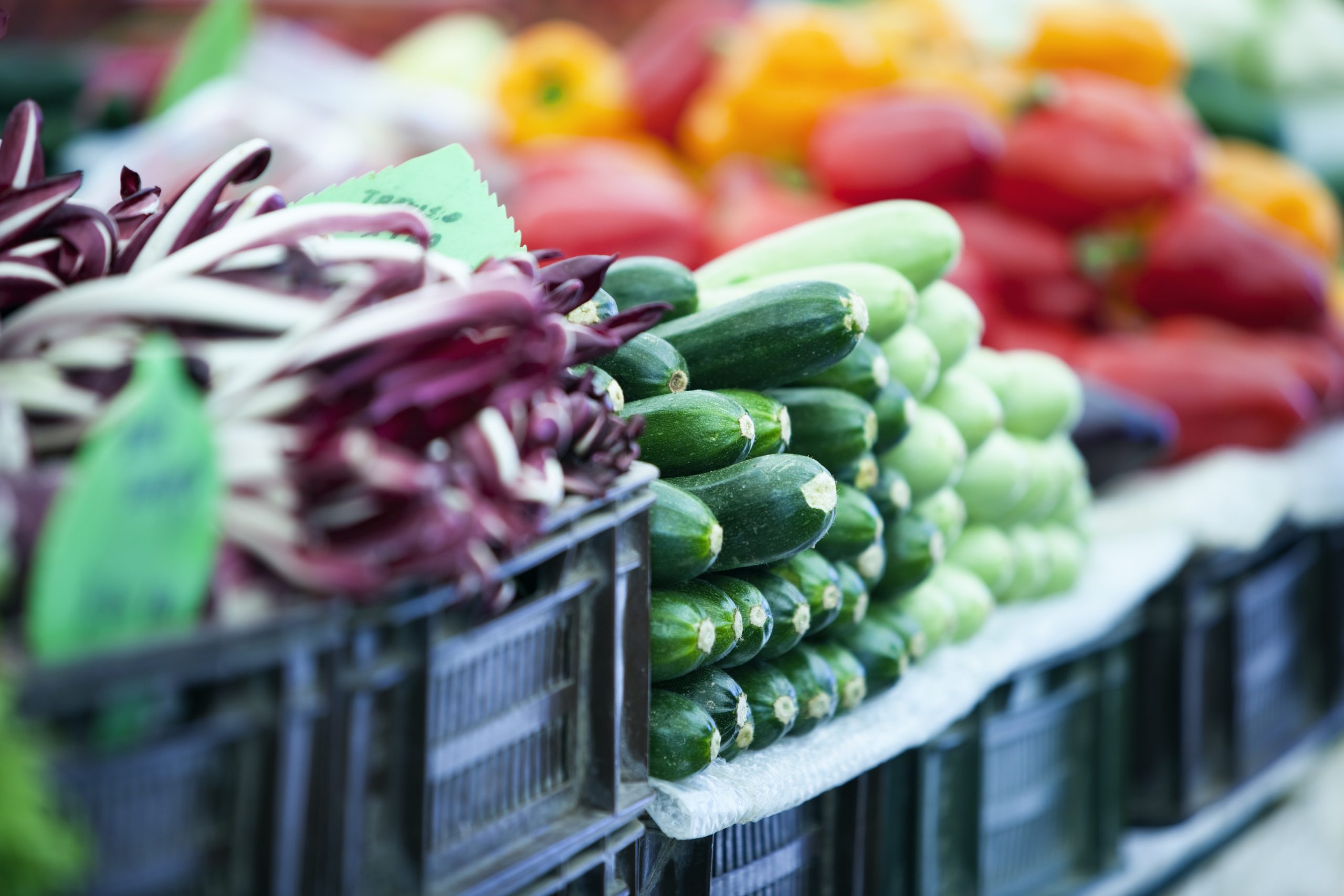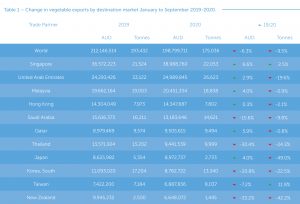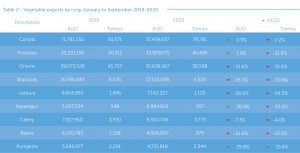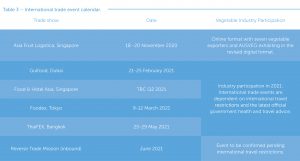
Life beyond COVID-19: The opportunity for fresh produce
30 November 2020
Seasonal horticulture labour shortages predicted to reach 26,000
30 November 2020Australian vegetable grower-exporters have demonstrated strong resilience in their businesses and supply chains to continue to export during the first three quarters of 2020 and their hard work is reflected in the latest trade data from January to September 2020. AUSVEG National Manager – Export Development Michael Coote reports.
Australia’s export of fresh vegetables recorded an average dip of 7.9 per cent across export value and volume. With less planes in the air and emerging issues with seafreight, the industry has managed to achieve export value of $199 million and 175,036 tonnes during the first nine months of 2020. Some markets and export crops have seen increases in trade during COVID, with others experiencing fluctuating demand during the year.
Exports from January to September 2020
Australia is now nine months into the global pandemic and total vegetable exports have seen a moderate decline compared to the same period in 2019. Based on data from the Global Trade Atlas, there was a 6.3 per cent decrease in vegetable export value, from $212.1 million to $198.8 million. Total vegetable export volumes also declined by 9.5 per cent, from 193,432 tonnes to 175,036 tonnes over the same period.
The top four markets for fresh vegetable exports – Singapore, The United Arab Emirates (UAE), Malaysia and Hong Kong – have all seen an increase in trade value during 2020.
Demand in Singapore remained strong for Australian fresh vegetables and is the only trading partner that has recorded a positive increase in both export value and volume in this period. There is a positive uptick in export value by 6.6 per cent from January to September 2020, from $36.6 million to $38.9 million; export volume improved by 2.5 per cent from 21,524 tonnes to 22,053 tonnes. The UAE saw growth of 2.9 per cent in value but a significant decline in volume of 19.6 per cent. Malaysia recorded a 4.0 per cent rise in export value and a slight dip of 0.9 per cent in tonnage.
Thailand and South Korea have seen a decline in trade with an average drop of 27.3 per cent in both value and volume for Thailand and an average drop of 21.6 per cent in South Korea (refer to Table 1).
Exports by crop
Volumes of root vegetable exports, such as carrots and potatoes, remained stable. Carrot export value increased by 0.9 per cent from $71.8 million to $72.5 million and potato export value increased from $33.3 million to $33.9 million, 1.9 per cent up on the same period last year. Asparagus started its export season strongly with a jump of 36.9 per cent in export value from $5 million to $6.9 million. Pumpkin exports continue to grow with a substantial increase of 29.8 per cent in export value and 15.6 per cent increase in export volume (refer to Table 2).
Nine months into the global pandemic environment, sea freighted root vegetables have performed better than exports of more perishable vegetables. However, carrots, potatoes and onions also experienced fluctuating trade from month to month in various markets.
Export Readiness Program
AUSVEG, in partnership with ECA, launched Export Fundamentals for Australian Fruit & Vegetable Growers: From Farmgate to International Markets in September 2020. This course is customised to the Australian vegetable industry to provide foundational training for growers to understand a broad range of topics relating to international trade for fresh produce.
Building on the successes, learnings and findings from previous Export Readiness Training Workshops, AUSVEG identified the need to transition the workshop program to an online format. The online format ensures growers from around the country can access this export development content without having to attend a scheduled workshop.
There is a total of 11 modules in the training course covering topics such as Export Readiness, Market Access and Market Research, International Market Entry, Export Documentation, and Freight and Logistics. For more information on how to access this new online course, please click here.
Cultural Business Etiquette Program
Funded by Package Assisting Small Exporters – an Australian Government initiative through the Department of Agriculture, Water and the Environment – AUSVEG has partnered with Bisnis Asia to create the Build Your Business Overseas – Like A Local cultural business etiquette online training course, which launched in November 2020.
This course aims to improve vegetable grower-exporters export capability by developing engagement skills that will make a difference with existing and potential customers in Asia and the Middle East. The course is suitable for existing vegetable grower-exporters who already have experience in international markets and want to optimise growth opportunities through stronger engagement with customers.
For national vegetable levy paying grower-exporters with an interest in building cultural awareness in Japan, South Korea, Indonesia and the Middle East, please register via the export page of the AUSVEG website.
International Freight Assistance Mechanism Extension
As most exporting growers will be aware, the government has committed $317.1 million to extend the International Freight Assistance Mechanism (IFAM) until the middle of 2021. This is positive news and growers are strongly encouraged to continue to engage with their Freight Forwarder to secure space on IFAM flights.
International Trade Events
Through the Vegetable Industry Export Program (VG16061), a strategic levy investment under the Hort Innovation Vegetable Fund, AUSVEG coordinates grower participation in several international trade missions aligned with major tradeshows.
Many of these events have been postponed or deferred until 2021 and industry participation will be subject to health advice and travel restrictions at the time (refer to Table 3).
Find out more
Any growers interested in any export events or discussing export opportunities can contact the AUSVEG Export Development team on 03 9882 0277 or export@ausveg.com.au.
This project has been funded by Hort Innovation using the vegetable research and development levy and contributions from the Australian Government.
Project Number: VG16061
This article first appeared in Vegetables Australia – Summer 2020/21. To read the full publication, please click here.




